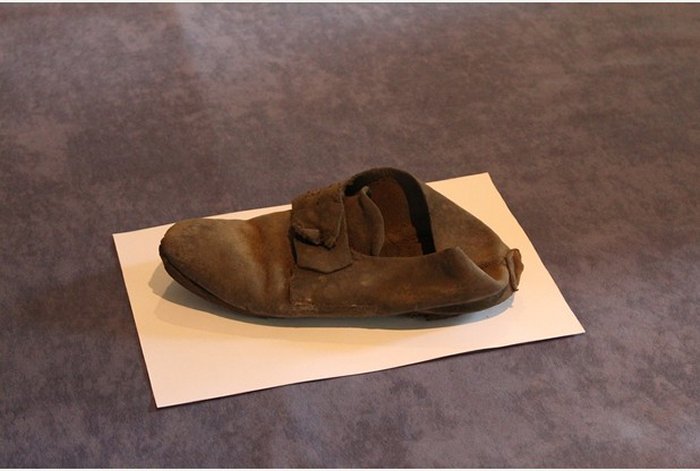MessageToEagle.com – A recent accidental discovery in Cambridge shows how widespread superstition was even among learned people and how far former residents went to protect themselves from evil spirits.
While installing new cables at Cambridge’s St John’s College workers found a 300-year-old shoe hidden inside the wall. We have previously seen a number of unusual ancient shoes, but this particular one had a specific purpose, namely to ward off evil spirits.
The shoe, measuring about a size 6 by modern standards, had been well-worn, with a hole in the heel.
It was kept at the Senior Common Room. Part of the college’s Tudor-era Second Court, the building was originally the private residence of its master.

The part of this building was built between 1598 and 1602, and it is thought the shoe was put behind the panels during changes to its interior, between the end of the 17th century, and mid-way through the 18th.
Superstitious people believed that these kinds of shoes could protect the living, and prevent malevolent spirits from entering. Similar finds have been made at Ely Cathedral, and Hampton Court Palace.
Although shoes were the most common item of choice for keeping spirits at bay, they were far from the only object embedded in walls for this purpose.
More gruesome objects, including dead cats, horses’ skulls, and “witch bottles”, which contained substances such as hair and urine, have also been found.
They were hidden in walls, roofs and beneath floors to prevent malevolent forces from bringing bad luck to the building, or its occupants.
Richard Newman, from the Cambridge Archaeological Unit, which is analyzing the shoe, said: “It was positioned between the chimney breast and the window, which is exactly the sort of location where you would expect to find a shoe being used in this way.
“Given its location, it is very likely that it was there to play a protective role for the master of the College. It may even have been one of his old shoes.”
He added: “This is one area where archaeological finds are quite important. There is not a lot of documentary evidence about people’s beliefs in ritual magic in the past, and often the sources that we have are very negative and disparaging about such practices.
“These discoveries are important because they give us a material record of what people may have believed at the time.”
The college’s head of maintenance Steve Beeby said the tradition of workers leaving coins or other things in a wall still exists today.
He said: “These days it’s more like leaving a signature to say we were here. In terms of keeping evil spirits away though, this shoe seems to have done a good job so far.”
Ominously, the find was revealed on August 1, which is also the birthday of the Cambridge academic and ghost story writer, M R James. His tales often begin with the discovery of an antique object, which then unleashes supernatural peril from beyond the grave.
See also:
Gargoyles – Mysterious Ancient Fearsome Creatures Warding Off Evil
World’s Oldest Shoes: Some Look Surprisingly Modern
Witch Bottle Protecting From Evil Spirits Discovered During Newark Civil War Centre Dig
No such misfortune has befallen St John’s since the shoe was uncovered.
It has been decided the shoe will be placed back inside the wall with a 21st-century time capsule once the work is complete.
There are still many secrets surrounding Cambridge’s St John’s College. Last year, bones of more than 1,300 people have been discovered deep underneath St John’s College, in one of the largest finds of its kind in British history.
Measuring around 40 by 14 meters, the cemetery contained neat gravel paths and a water well, while plant seeds found at the site indicate graveside flowers were regularly planted.
Most of the burials took place without coffins, suggesting the cemetery was primarily used to serve the city’s poor.
Of the remains that could be identified, there seems to have been a roughly equal gender balance, with the majority of individuals having died between around 25 and 45 years old.
No evidence of the Black Death was found among the remains.
MessageToEagle.com







